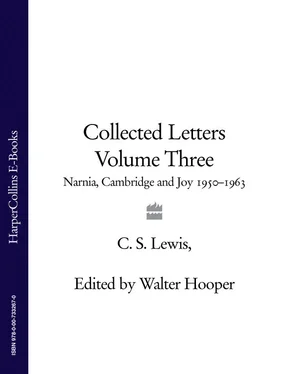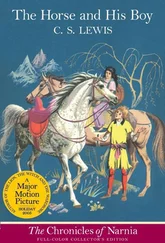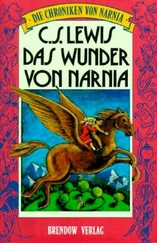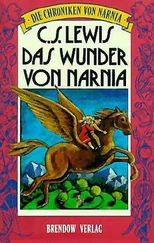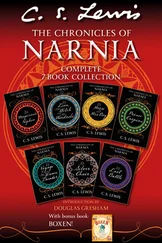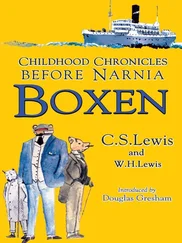‘Regular but cool’ in Church attendance is no bad symptom. Obedience is the key to all doors: feelings come (or don’t come) and go as God pleases. We can’t produce them at will and mustn’t try.
Yours sincerely
C. S. Lewis
Sheldon Vanauken’s 193 autobiographical A Severe Mercy (1977) is the heartrending story of his marriage to Jean ‘Davy’ Davis. They first met at the outbreak of the Second World War when Vanauken was in his second year at Wabash College in Indiana. They fell in love and married a few months later. From the first they devised what they called ‘The Shining Barrier’ which was meant to act as a ‘defence against creeping separ-ateness’. 194 Vanauken joined the Navy in March 1941 and was sent as a US naval lieutenant commander to Pearl Harbor, where he was stationed when it was bombed by the Japanese on 7 December 1941 .
On leaving the Navy in November 1945 he went to Yale University with Davy where he took an MA degree in History. In the Michaelmas Term 1949 they moved to Oxford where Vanauken began work on a B. Litt. degree at Jesus College. At this time Vanauken spelt his name ‘Van Auken. Neither was a believer, but it was not long before they began to see things differently. They read a number of Lewis’s books and in December 1950 Vanauken wrote to Lewis:
Having felt the aesthetic and historical appeal of Christianity, having begun to study it, I have come to awareness of the strength and ‘possibleness’ of the Christian answer. I should like to believe it. I want to know God…But I cannot pray with any conviction that Someone hears. I can’t believe.
Very simply, it seems to me that some intelligent power made this universe and that all men must know it, axiomatically, and must feel awe at the power’s infiniteness. It seems to me natural that men, knowing and feeling so, should attempt to elaborate on the simplicity—the prophets, the Prince Buddha, the Lord Jesus, Mohammed, the Brahmins—and so arose the world’s religions. But how can just one of them be singled out as true? 195
TO SHELDON VANAUKEN (BOD):
Magdalen College
Oxford
14/12/50
Dear Mr. Van Awten
My own position at the threshold of Xtianity was exactly the opposite of yours. You wish it were true: I strongly hoped it was not . At least, that was my conscious wish: you may suspect that I had unconscious wishes of quite a different sort and that it was these which finally shoved me in. True: but then I may equally suspect that under your conscious wish that it were true, there lurks a strong unconscious wish that it were not. What this works out to is that all that modern stuff about concealed wishes and wishful thinking, however useful it maybe for explaining the origin of an error which you already know to be an error, is perfectly useless in deciding which of two beliefs is the error and which is the truth. For (a.) One never knows all one’s wishes, and (b.) In very big questions, such as this, even one’s conscious wishes are nearly always engaged on both sides.
What I think you can say with certainty is this: the notion that everyone would like Xtianity to be true, and that therefore all atheists are brave men who have accepted the defeat of all their deepest desires, is simply impudent nonsense. Do you think people like Stalin, Hitler, Haldane, Stapledon (a corking good writer, by the way) wd. be pleased on waking up one morning to find that they were not their own masters, that they had a Master and a Judge, that there was nothing ever in the deepest recesses of their thoughts about which they cd. say to Him ‘Keep out. Private. This is my business’? Do you? Rats! Their first reaction wd. be (as mine was) rage and terror. And I v. much doubt whether even you wd. find it simply pleasant. Isn’t the truth this: that it wd. gratify some of our desires (ones we feel in fact pretty seldom) and outrage a great many others? So let’s wash out all the Wish business. It never helped anyone to solve any problem yet.
I don’t agree with your picture of the history of religion—Christ, Buddha, Mohammed and others elaborating an original simplicity. I believe Buddhism to be a simplification of Hinduism and Islam to be a simplification of Xtianity. Clear, lucid, transparent, simple religion (Tao plus a shadowy, ethical god in the background) is a late development, usually arising among highly educated people in great cities. What you really start with is ritual, myth, and mystery, the death & return of Balder or Osiris, the dances, the initiations, the sacrifices, the divine kings. Over against that are the Philosophers, Aristotle or Confucius, hardly religious at all.
The only two systems in which the mysteries and the philosophies come together are Hinduism & Xtianity: there you get both Metaphysics and Cult (continuous with the primeval cults). That is why my first step was to be sure that one or other of these had the answer. For the reality can’t be one that appeals either only to savages or only to high brows. Real things are like that (e.g. matter is the first most obvious thing you meet—milk, chocolates, apples, and also the object of quantum physics).
There is no question of just a crowd of disconnected religions. The choice is between (a.) The materialist world picture: wh. I can’t believe, (b.) The real archaic primitive religions: wh. are not moral enough (c.) The (claimed) fulfilment of these in Hinduism, (d.) The claimed fulfilment of these in Xtianity. But the weakness of Hinduism is that it doesn’t really join the two strands. Unredeemably savage religion goes on in the village: the Hermit philosophises in the forest: and neither really interferes with the other. It is only Xtianity wh. compels a high brow like me to partake in a ritual blood feast, and also compels a central African convert to attempt an enlightened universal code of ethics.
Have you tried Chesterton’s The Everlasting Man? 196 The best popular apologetic I know.
Meanwhile, the attempt to practice the Tao is certainly the right line. 197 Have you read the Analects of Confucius? He ends up by saying ‘This is the Tao. I do not know if any one has ever kept it.’ That’s significant: one can really go direct from there to the Epistle to the Romans .
I don’t know if any of this is the least use. Be sure to write again, or call, if you think I can be of any help.
Yours sincerely
C. S. Lewis
TO R B. GRIBBON (W): 198 TS
REF. 50/185.
Magdalen College,
Oxford.
19th December 1950.
Dear Mr. Gribbon,
It is also a far cry from December in Oxford to mid-Iune in Oxford! Thanks for your kind greetings, and the same to you. I too hope that we may meet again, either here or, better still, in Co. Down.
Yours sincerely,
C. S. Lewis
TO VERA MATHEWS (W): TS
REF.50/81
Magdalen College,
Oxford.
19th December 1950.
Dear Miss Mathews,
Many thanks for all the kind and encouraging things you say about the new book. 199 I’m glad you enjoyed it.
The cutting is a treasure; you had better invest in a stock of these collars quick. For I doubt if your President will consider their manufacture really essential to America’s geared up emergency programme!
My brother joins me in sending you all best wishes.
Yours sincerely,
C. S. Lewis
TO MRS FRANK L. JONES (W): TS
REF.50/18.
Magdalen College,
Oxford.
21st December 1950
Dear Mrs. Jones,
What, again!! Really two large and handsome food parcels in the same month is spoiling us completely. Here is a beauty from CARE just come in, in nice time for Christmas, and we are all very grateful indeed to you for it. On your bounty we shall ride comfortably into the New Year. Let us hope that it will be a better one than 1950, though I’m afraid there is not a very bright prospect before any of us.
Читать дальше
